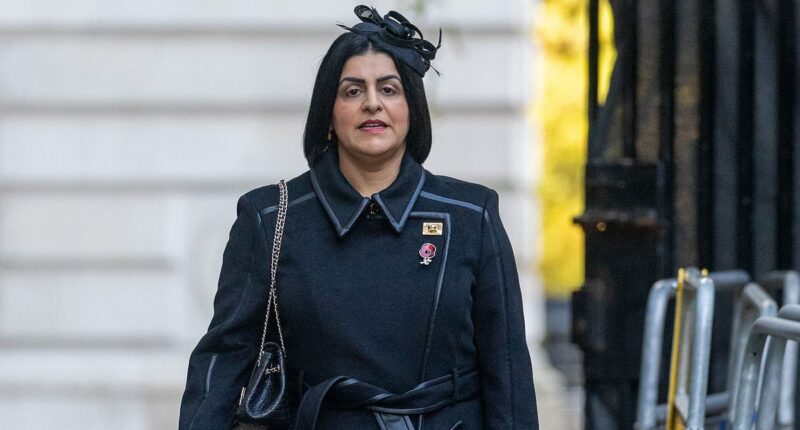Share this @internewscast.com
Labour has announced plans to eliminate police and crime commissioners, a decision they claim will save taxpayers £100 million.
The Home Secretary intends to transfer responsibility for overseeing local policing to mayors or policing boards composed of local councillors.
Shabana Mahmood stated that police and crime commissioners would be phased out starting in 2028, aligning with the next round of elections that historically experience low voter turnout.
The role was originally established by Baroness May in 2012 to ensure police forces and fire services were accountable to elected officials.
These commissioners possess the authority to remove chief constables, devise crime-fighting strategies, and manage local police budgets and council tax precepts.
However, critics argue that PCCs, who can earn up to £101,900, merely add an unnecessary layer of bureaucracy and squander taxpayer funds.
Ministers claim their abolition will save £100million during this parliament – up to 2029 – followed by about £20million a year, which could fund ‘320 extra police constables’.
Ms Mahmood said today: ‘The introduction of Police and Crime Commissioners by the last government was a failed experiment.
‘I will introduce new reforms so police are accountable to their local mayoralties or local councils. The savings will fund more neighbourhood police on the beat across the country, fighting crime and protecting our communities.’
But shadow home secretary Chris Philp claimed the move ‘would not really save any money’ and risked replacing named elected officials with ‘a committee of faceless bureaucrats’.
Meanwhile, the Association of Police and Crime Commissioners (APCC) warned it risked creating a ‘dangerous accountability vacuum’ and complained there had been a ‘lack of engagement’ by the Home Office over the decision.
The axing of PCCs may be politically attractive to the government given there are currently only 14 Labour PCCs compared to 18 Conservatives. By contrast, just two directly elected mayors are Tories, versus 10 that represent Labour and two Reform.

Home Secretary Shabana Mahmood said PCCs will be abolished from 2028 to coincide with the next slate of elections – which typically suffer from low turnouts
Police minister Sarah Jones told the Commons the system, set up by the Tories in 2010, had ‘failed to live up to expectations’.
‘The reality is that the PCC model has weakened local police accountability and has had perverse impacts on the recruitment of chief constables,’ she said.
‘They have failed to inspire confidence in local people, in stark contrast to the mayoral model, which has clearly been ultimately more successful. The Theresa May model has not worked.’
Ms Jones went on: ‘I can therefore announce today that we will abolish PCCs at the end of their current term in 2028 and transfer functions to mayors wherever possible.
‘In areas where plans do not yet allow for a transfer of policing to a mayor … we will establish new policing and crime boards to bring council leaders together to oversee the police force in their area until such time as mayors are in place.’
The new boards will include local councillors, mayors and ‘co-opted members with appropriate skills and experience’.
The minister said the new plans would be different to the system that existed before the creation of PCCs, when forces were overseen by ‘police authorities’ – committees of local councillors and independent members who had the power to quiz chief constables on local issues.
‘We are absolutely clear that these boards will not be a return to the bureaucratic and invisible committee-based oversight of policing that existed before the establishment of PCCs,’ she said.
‘We will ensure council leaders are empowered to exercise police governance functions.
‘They will be supported by a policing and crime lead, akin to a deputy mayor for policing and crime to carry out day-to-day activities on their behalf.
‘This will mean that every area will have a visible, nominated lead who will be dedicated to the oversight of policing in their area.’
Further details will be set out by the Home Office in a policing White Paper.
There will be separate arrangements in Wales and the City of London, she added.
Chris Philp accused the Government of ‘tinkering around the edges’ regarding policing reform.

The axing of PCCs may be politically attractive to the government as there are currently only 14 Labour PCCs compared to 18 Conservatives
He told the Commons: ‘The minister mentioned at the beginning the Government’s plans to bring forward a police reform white paper, announced, from memory, about a year ago.
‘But there hasn’t been a single sniff of that white paper since then. Perhaps she can tell us when we can expect it and why the Government is so bereft of ideas, it has taken a year or more to publish that white paper.
‘Now, today’s statement about police and crime commissioners represents, in my view, a tinkering around the edges from a Government which is failing on crime and policing.
‘If you like, it is simply rearranging the deckchairs on the Titanic, because this Government is failing, police numbers are falling – they fell by 1,300 during Labour’s first year in office on a like-for-like March-to-March comparison – and not only are police numbers falling, they are continuing to fall and will drop even more this year.’
In her response, Ms Jones said: ‘Saving £100 million, I think, is quite substantial and not ‘tinkering around the edges’ as he suggests.
‘But what I would say to him is, if he waits a few more weeks, he will see the reform agenda that the Home Secretary (Shabana Mahmood) is designing in its totality. And it will put policing on a much better footing than he left it.’
APCC chairman Emily Spurrell, who is also the PCC for Merseyside, criticised Labour’s move.
‘On behalf of our communities we are deeply disappointed by this decision and the lack of engagement with us,’ she said.
‘For more than a decade, directly elected PCCs have transformed policing accountability and delivered essential support services for victims of crime.
‘Having a single, visible local leader – answerable to the public – has improved scrutiny and transparency, ensuring policing delivers on the issues that matter most to local communities.
‘Abolishing PCCs now, without any consultation, as policing faces a crisis of public trust and confidence and as it is about to be handed a much stronger national centre, risks creating a dangerous accountability vacuum.’
She said: ‘Whatever follows in our place must be rooted in local and national accountability, clear and identifiable leadership and connected to local communities. The public deserve nothing less.’
Today’s decision sets the scene for more extensive policing reform under Ms Mahmood.
Measures already outlined by Labour include a new National Centre of Policing, which will centralise services including IT and forensics.
Over the summer, Sir Mark Rowley called for Britain’s 43 county constabularies to be axed and replaced with 12 ‘mega forces’ in what would be the biggest overhaul of policing in 60 years.
In a damning review of the UK’s crime fighting set up, the Met Police chief said the current system has not ‘been fit for purpose for at least two decades’.
Sir Mark believes bigger forces would be better able to utilise modern technology and would reduce ‘expensive’ governance and support functions.
And he said slashing the number of forces by two-thirds would make ‘better use of the ‘limited funding available’.
Sir Mark has previously criticised Chancellor Rachel Reeves’ decision to increase police funding by 2.3 per cent above inflation each year as ‘disappointing’.

















